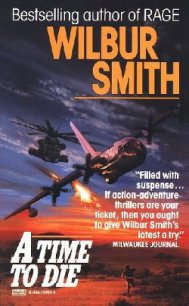Elephant Song - Smith Wilbur (книги бесплатно без онлайн txt) 📗
Truly to appreciate luxury it is necessary to have withstood severe hardship, Tug believed. The early days had been tough.
He had revelled in each one of them but, hell, the touch of silk against his skin and the Rolls upholstery under his backside felt wonderful and he was looking forward to the negotiations that lay ahead. They would be hard and without quarter, but that was the way he liked it.
He loved the cut and thrust of the bargaining table. He enjoyed changing his style to match each adversary he faced.
He could flash the cutlass or palm the stiletto as the occasion warranted. When called for he could shout and bang the table and curse with the same vigour as an Australian opal miner or a Texan rough-neck on an oil rig, or he could smile and whisper honeyed hemlock as skilfully as could the man he was now going to meet. Yes, he loved every moment of it. It was what kept him young.
He smiled genially and turned to discuss oriental nctsukes and ceramics with the young man who sat beside him on the pale green leather back seat of the Rolls. Generalissimo Chiang Kai-shek brought the cream of China's art treasures with him from the mainland inNing Cheng Gong was saying, and Tug nodded. All civilised men must be thankful for that, he agreed. if he had not done so, they would have been destroyed in Mao's cultural revolution.
As they chatted, Tug was studying his host's youngest son.
Even though he had not yet shown himself to be a force in the Ni g financial dynasty, and up until now had been overshadowed by his elder half-brothers, Tug had a full dossier on Cheng.
There was some indication that Cheng, even as the youngest son, was his father's favourite, the child of his old age, by his third wife, a beautiful English girl. As often happens, the admixture of oriental and Occidental blood seemed to have brought out the good traits of both parents. It seemed that Ning Cheng Gong had bred true, for he was clever, deviously ruthless, and lucky. Tug Harrison never discounted the element of luck. Some men had it and others, no matter how clever, did not.
It seemed that old Ning Heng H'Sui was bringing him on carefully, like a fine thoroughbred colt, preparing him for his first major race with patience and diligence. He had given Cheng all the advantages, without allowing him to grow up soft.
After his master's degree at Chiang Kai-shek University, Ning Cheng Gong had gone straight into the Taiwanese army for national service.
His father had made no effort to beat the draft on his behalf. Tug supposed that it was part of the toughening process.
Tug Harrison had a copy of the young man's military service record.
He had done well, very well, and had ended his call-up with the rank of captain and a job on the general staff. Of course, the commander of the Taiwanese army was a personal friend of Ning Heng H'Sui, but his selection would not have been entirely based on preferment rather than ability. There had been only one small shadow on Cheng's service record. A civilian complaint had been brought against Captain Ning, and investigated by the military police. It involved the death of a young girl in a Taipei brothel. The full report of the investigating officer had been carefully removed from Ning's service record and only the recommendation that there was no substance in the accusation remained, together with an endorsement by the Attorney-General that no charges be pursued.
Once again Tug Harrison scented the intervention of the Ning patriarch in this dossier. It increased Tug's respect for the power and influence of the family.
At the end of his national service, Ning Cheng Gong had gone into the Taiwanese diplomatic corps. Perhaps old Heng had not yet considered him ready to join the Lucky Dragon.
Once again young Cheng's progress had been meteoric, and he had been given an ambassadorship within four years, admittedly it was to a small and insignificant little African country, but by all accounts he had done well. Once again Tug had been able to obtain a copy of his service record from the Taiwanese foreign office. It had cost him ten thousand pounds sterling in bribes, but Tug considered it a bargain.
In this dossier he had again found some evidence of Cheng's unusual erotic tastes.
The body of a young black girl had been fished out of the Zambezi river only partially devoured by crocodiles. There was certain mutilation of the corpse's genital and mammary areas which had led the police to pursue further enquiries. They found that at the time the Chinese ambassador had been staying at a game lodge on the Zambezi south bank, near the girl's village. The missing girl had been seen entering Cheng's bungalow late on the evening before she disappeared.
She had not been seen again alive. This was as far as the enquiry had been allowed to run, before being quashed by a directive from the president's office.
Now the ambassador's term of office had run its course. He had resigned from the diplomatic service and returned to Taiwan to take up a position with the Lucky Dragon company, at last.
His father had given him the equivalent rank of vice-president, and Tug Harrison found him interesting. Not only was he clever but he was goodlooking to the Western eye. His mother's influence was discernible in his features; although his hair was jet black there were no epicanthic folds in his upper eyelids. His English was perfect. If Tug closed his eyes he could imagine he was conversing with a young upper-class Englishman. He was suave and urbane, with just the slightest perceptible streak of ruthlessness and cruelty in him. Yes, Tug decided, he was a young man with prospects. His father could be proud of him.
Tug felt the familiar stab of regret as he thought of his own feckless offspring, weaklings and wastrels all three. He could only console himself by believing that the fault must lie in their maternal line. They were the sons of three different women'all of whom he had chosen for their physical attractiveness. When you are young there is no reasoning with an erect penis, he shook his head regretfully, it seemed to inhibit the flow of the blood to the brain. He had married four women whom he would not have employed as, secretaries, and three of them had given him sons in their mirror image, beautiful and lazy and irresponsible.
Tug frowned at this shadow across his sunny mood. Most men give more thought and care to the breeding of their dogs and horses than they do to selecting a dam for their own children. Fatherhood was the only endeavour in his entire life in which Tug Harrison had failed dismally.
I am looking forward to viewing your father's collection of ivory, Tug told Cheng, putting unprofitable regret out of his mind.
My father will be pleased to show it to you, Cheng smiled. It is his chief delight, after the Lucky Dragon, of course. As he said it, the Rolls sailed around another hairpin and directly ahead stood the gates to the Ning estate. Tug had seen a photograph of them, but still he was not prepared for the actuality. They reminded him instantly of those gigantic garish sculptures in the Tiger Balm Gardens in Hong Kong.
The Lucky Dragon entwined itself around the gateway like a prehistoric monster, glittering with emerald-green ceramic tiles and gold leaf. Its talons were hooked and raised, its wings were spread fifty feet wide, its eyes glowed like live coals and its crocodile jaws were agape and lined with jagged fangs. My goodness!
said Tug mildly, and Cheng laughed lightly and deprecatingly. My father's little whimsy, he explained. The teeth are real ivory and the eyes are a pair of cabochon spinel-rubies from Sri Lanka. They weigh together a little over five kilos. They are unique and are valued at over a million dollars, hence the armed guards. The two guards came to attention as the Rolls slid through the gateway. They were dressed in paramilitary uniform with blancoed webbing and burnished stainless helmets similar to those worn by the honour guard at Chiang Kai-shek's tomb in Taipei. They carried automatic weapons and Tug Harrison guessed that they had other duties apart from guarding the Lucky Dragon's jewelled eyes. Tug had heard that young Cheng, using his military experience, had personally recruited these guards from the ranks of the Taiwanese marines, one of the elite regiments of the world, to protect his father.




